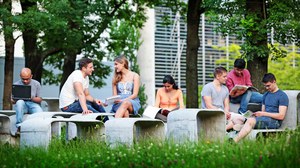Study at the Chair of Traffic Process Automation
We educate students in the field of "Traffic Telematics". The focus of our teaching includes scientifically challenging courses. These are offered in areas such as traffic process automation with its modern optimisation tools, optimal control, combined with decision-making methods, and road traffic control technology. Additionally, these are complemented by application-oriented lectures, internships, and specialised excursions, which reflect the multimodal approach pursued in this professorship
 © Amac Garbe
© Amac Garbe
Study at the Chair of Traffic Process Automation
Our education is based on the principles of our mission statement.
We provide future-oriented education based on the latest findings in science and technology.
With a focus on control engineering, we teach universal concepts and methods that will remain valid even 50 years from now, but we also incorporate modern techniques and current findings into our courses. Modern teaching methods and didactic insights are incorporated into our knowledge transfer. We value enabling self-directed learning and encouraging students to think critically and act responsibly.
We establish a solid theoretical foundation.
Control engineering is a major focus at our chair and forms the backbone of our education both in the fundamentals and specialisation. The profound knowledge our graduates gain in system and control theory enables them to understand, model, and influence complex system interrelations. Structured, careful work methods and presentation techniques are also taught. These skills provide a strong basis for efficient problem-solving and successful performance in industry and research.
We promote problem-solving thinking and impart knowledge based on current research and development projects.
Since 2006, nearly 100 research and development projects and contracts (externally funded projects) have been undertaken, with results and findings integrating into teaching.
For example, the traffic management system VAMOS for the greater Dresden area is developed and maintained by our staff members. Our current projects on electromobility particularly deal with providing information for the implementation of energy-saving driving models in road traffic. This includes green time predictions of traffic-dependent traffic signals, waiting queue length estimations and energy-efficient routing. Another research focus is driver assistance systems for implementing energy-saving driving models in railway transportation. Combined with traffic management methods, significant energy savings are demonstrable.
In addition to arranging internships and industry-driven student scientific thesis topics, students - if wished- are involved in current project work through projects, studies or theses.
We maintain contact with our graduates.
Even after their diploma theses, we continue to support our graduates with advice and action. We facilitate contacts with partners offering attractive entry-level jobs, assist in applying for awards for final theses, and remain connected with them throughout their working lives. Joint projects, events, and conferences frequently provide opportunities for reunions.





